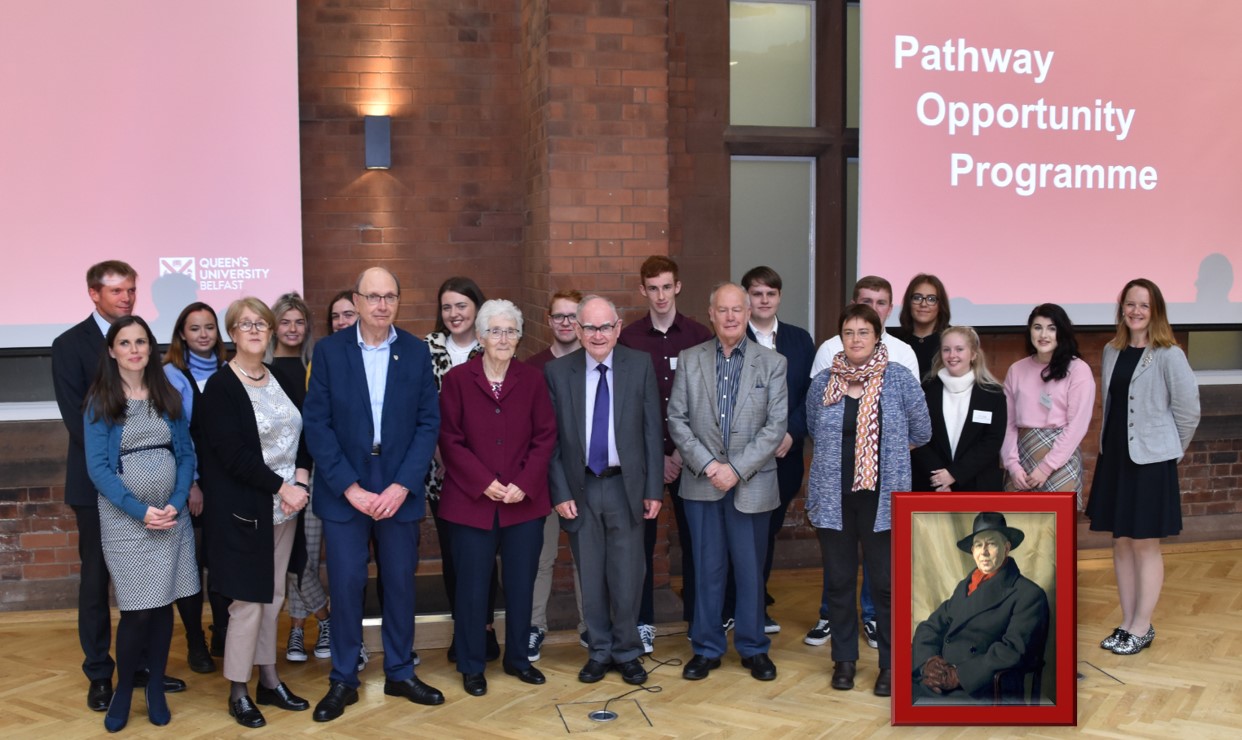WHY THE PATHWAY OPPORTUNITY PROGRAMME IS IMPORTANT TO ME - Dr Richard McMinn 
02 November 2020
Dr John Richard Browne McMinn, BA (1968), PhD (1979), Dip Ed (QUB) OBE – former Principal of Stranmillis University College and Honorary Professor of Queen’s – explains why he is a supporter of the University’s Pathway Opportunity Programme.
As a member of the immediate post-war generation, I was born into a family with no previous experience or tradition of university education. My father, the sole wage earner, was a police constable who had been brought up as a young person on lighthouse stations around the whole island of Ireland and my mother was an Islandmagee, County Antrim, farmer’s daughter and housewife.
I was their only child and in the years after 1945 their income was not particularly large, and we lived in rented public authority housing. Hence, I was one of the grateful beneficiaries of the post-war education reforms and had the opportunity of a sound grammar school education.
However, given my father’s increasing health problems and subsequent early retirement, my decision to opt for a university education rather than an immediate entry into the world of work was by no means inevitable.
Two factors proved crucial in influencing that decision.
My ability to access a full, means-tested, local authority maintenance grant plus an additional book grant, at a time when tuition fees were but a distant cloud on the horizon, meant that there was significant financial assistance available to me, which could later be supplemented by summer vacation paid employment (in my case driving a home bakery delivery van in and around my home town of Larne).
But as an eighteen-year-old, rather shy young adult from Larne, County Antrim, I was quite apprehensive about entering the seemingly alien worlds of both Queen’s and the city of Belfast.
Given the absence in those days of structured careers guidance in schools, or indeed any formal widening participation or mentoring programmes on offer at university level, I was fortunately given crucial encouragement and informal guidance from a rather unusual and colourful individual.
Dr Richard H (‘Dickie’) Hunter (1882-1970), MB MD MCh PhD, in many ways a rather maverick but fascinating retired Secretary of Queen’s, whose atmospheric portrait by distinguished artist James Gunn hangs today in the University’s Great Hall, was a personal friend of mine at this important early stage of my life.
As a celebrated former ‘mature’ Queen’s student (who completed his undergraduate degree in 1920, aged 38) and then a University staff member, not to mention sometime artist in pre-1914 Paris, volunteer Red Cross stretcher bearer at the Western Front for a year prior to injury during the First World War, student then lecturer in anatomy and embryology at his much loved Queen’s, prime mover and curatorial consultant in the creation of Belfast Zoological Gardens in the 1930s and ringmaster, booking agent and circus impresario in the 1940s and early 1950s, ‘Dickie’ was truly a ‘character’.
His Christmas circuses staged at Belfast’s now sadly lost Royal Hippodrome and Empire Theatres made him a household name in the city and far beyond. As an elderly gentleman, living in somewhat Bohemian style in a cottage in Ballynease, near his family’s native Portglenone, he kindly took the time to encourage me as a friend and mentor to accept the University’s offer of a place on the BA Arts Honours pathway in 1964.
His continuing support and that of my Modern History tutors, notably the late Alan Graham, were to prove crucial when, following my first year at Queen’s, my father died suddenly of a heart attack and my resolve to complete my Modern History degree consequently wavered slightly.
All of my subsequent career experiences and achievements, I therefore owe to these two significant factors – a degree of useful financial support and the mentoring support (albeit more informal in those days) which both enabled me to take the hesitant first step into a lifelong academic career and then to overcome the danger of an emotional ‘wobble’ resulting from the shock of my father’s untimely death.
So my enthusiasm for the excellent Pathway Opportunity Programme at my much-loved alma mater, which I have taken the opportunity to observe at first-hand through personal interaction with the staff organising it and some of the students benefiting from it, is understandable.
As one of its supporters, I have also found my own limited involvement to be personally enriching and a logical extension to a career devoted to encouraging the academic endeavours of young people at Stranmillis University College, especially those, like me, from non-traditional home backgrounds.
In some small way, I feel that I am acknowledging the vital support given to me in my youth, and that my old friend Dr Hunter, whose personal papers I have recently deposited in the Public Record Office of Northern Ireland, as someone who himself came from a non-traditional home background, would have thoroughly approved.
To find out more about supporting the Widening Participation / Pathway Opportunity Programme contact Viv Harris, Development Manager in Queen’s Development and Alumni Relations Office, or donate here.
For general enquiries about this story, or to submit a graduate news item, please contact Gerry Power, Communications Officer, Development and Alumni Relations Office, Queen’s University Belfast.
Main image (above): Richard McMinn (front row, 3rd from left) pictured with student recipients at the POP Bursary event in Riddel Hall (October 2019). Among others included are Derick Woods and Helen Hood (donors to the Pathway programme) (4th and 5th from left); Simon McDowell from Kilwaughter (major County Antrim company which supports POP); Helen Carrick, Head of Major Gifts at Queen’s, (front row, 1st left), Nathalie Trott, Director of Development and Alumni Relations at Queen's (extreme right) and, inset, Dr Dickie Hunter.
Headline image: Circus poster from among Dr Dickie Hunter’s personal papers deposited by Dr McMinn in the Public Record Office of Northern Ireland (PRONI/Flickr).
Back to Main News
Top of Page